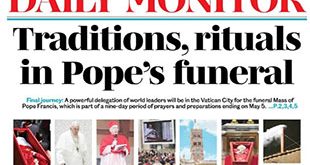A judge was tasked with examining the case and the first hearing was scheduled for June 26 at a Johannesburg court. For Cajee it was a cathartic victory following a long, emotional fight.
“I have very faint memories of my uncle. When he was murdered in 1971, I was merely five-years-old,” he said.
“But… from a very young age, the death of my uncle had an impact on me.”
In April 1996, Cajee’s grandmother relieved Timol’s final hours in front of the Truth and Reconciliation Commission (TRC), a public forum established to air the horrors of apartheid South Africa that was chaired by Archbishop Desmond Tutu.
– ‘Honour and legacy of my uncle’ –
“I (vowed) to do something constructive to preserve the honour and legacy of my uncle,” said Cajee.
But despite his grandmother’s powerful testimony, the case remained largely forgotten.
Undeterred, Timol’s nephew began to investigate the case, poring over old documents to get to the truth which led him to apply to prosecutors to reopen the file. His application was rejected after a delay of four years.
Opening probes into deaths like that of Timol threatened to implicate members of the ruling African National Congress (ANC) party, said Yasmin Sooka, executive director of the Foundation for Human Rights (FHR) and a former member of the TRC.
“They (the apartheid generals) had always said that if the NPA pursues this kind of case then they will certainly begin to lay private prosecutions against members of the ANC,” she said.
With the help of Sooka’s HRF, Cajee successfully reapplied for the case to be reconsidered.
And even if all of the police officers implicated in the incident have since died, Timol is eagerly awaiting the outcome of the renewed probe.
But even half-a-century after the original incident, Cajee has faced opposition to his bid to re-examine the contested and violent legacy of the apartheid era.
“It was clear during the inquest that the security branch had no motive at all to kill Timol,” said J.P. Botha, a spokesman for the Foundation for Equality Before the Law which represents former police chiefs.
Beyond Ahmed’s case, many other families are also seeking to expose the crimes of the apartheid regime and its supporters.
“Now we have gone through this entire period without any prosecution,” said Sooka. “It makes a mockery about the very promise upon which the new South Africa is built.
“It’s important, I think, to close the circle of impunity.”
“It’s 45 years later but justice is never too late,” said Mohammad Timol. “It comes one day.”
 The Independent Uganda: You get the Truth we Pay the Price
The Independent Uganda: You get the Truth we Pay the Price



